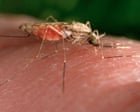
In a world that’s continually evolving, each breath we take is both a testament to human resilience and a reminder of the challenges we face. Recently, three health issues have captured global attention: the resurgence of malaria in Zimbabwe, the looming threat of antimicrobial resistance (AMR), and the rise in maternal mortality in the UK. Let us explore these with a calm and thoughtful perspective.
Zimbabwe, once making strides in combating malaria, has seen the disease re-emerge with alarming intensity. The mosquito-borne illness, which had been under control, has witnessed a concerning rise in cases. Experts attribute this uptick to recent cuts in international aid, specifically from the United States. The reduction in funding has impacted essential research efforts and the distribution of mosquito nets, vital tools in controlling the spread of malaria. The data reveals that from having just one outbreak last year, the nation now faces 115 outbreaks in a year. As the country navigates these challenges, it highlights the delicate balance of progress in public health and the threat posed by withdrawing financial support.
In parallel, a global health conundrum advances silently—antimicrobial resistance. Recent studies predict a chilling future unless mitigated by concerted global efforts. The rising resistance to antibiotics threatens to undo decades of medical advancements, leading potentially to severe economic and humanitarian crises. If unchecked, superbugs are anticipated to claim millions of lives annually by 2050 and inflict a hefty economic cost of approximately $2 trillion per year worldwide. These predictions stem from comprehensive research covering 122 countries, underscoring the urgent need for multi-national collaboration, robust policy-making, and public health advocacy to forestall this silent pandemic.
The UK confronts another pressing health issue with the disconcerting rise in maternal deaths. Despite a decline in the birth rate, more women are experiencing critical challenges during pregnancy or shortly after childbirth. Recent figures reveal an increase from 209 maternal deaths between 2015-2017 to 254 in 2021-2023. This upward trend has sparked concern and calls for action to better support and safeguard maternal health. The increased mortality rates urge a reflection on the systems and structures in place, emphasizing the necessity for improved healthcare protocols and accessibility to comprehensive maternal care services.
While these health issues may emanate from different parts of the globe, they serve as poignant reminders of our interconnectedness. Addressing them requires collective wisdom and action that transcends borders. To this end, international cooperation and strategic investment remain pivotal. By fostering innovation, encouraging sustainable practices, and prioritizing health equity, we can mold a future where health challenges are met with resilience and resolve.
As we navigate these complex realities, the importance of community, empathy, and unified action becomes clear. It is through mindful collaboration that we can transform challenges into opportunities, ensuring a healthier, more harmonious world for future generations.
Source: {link}
